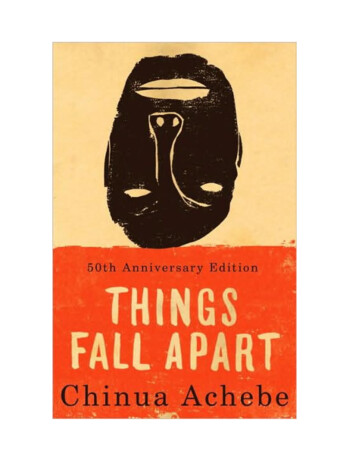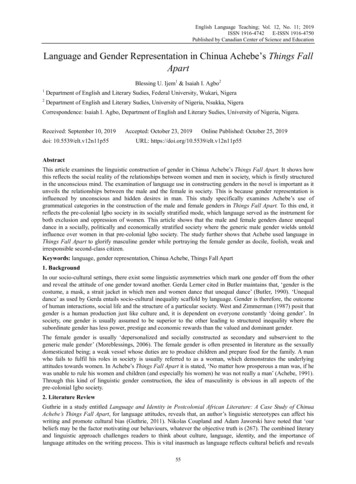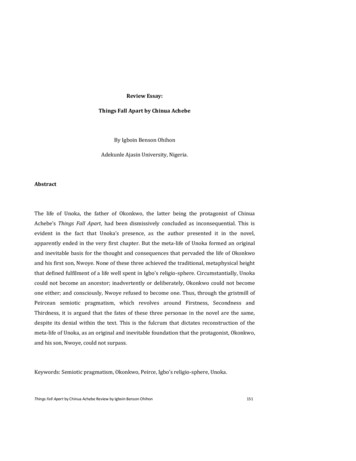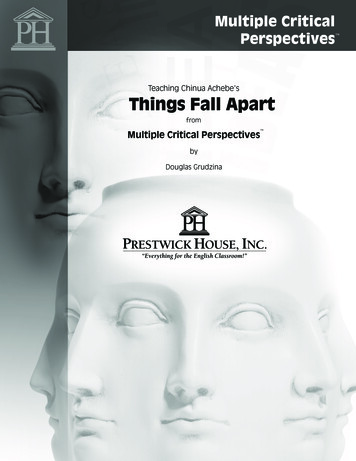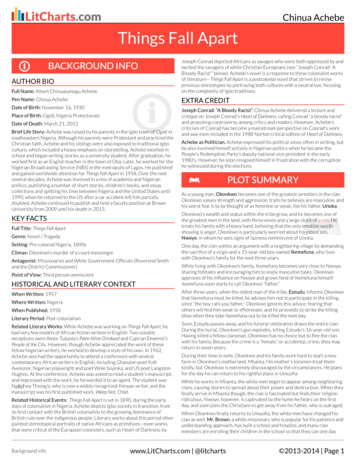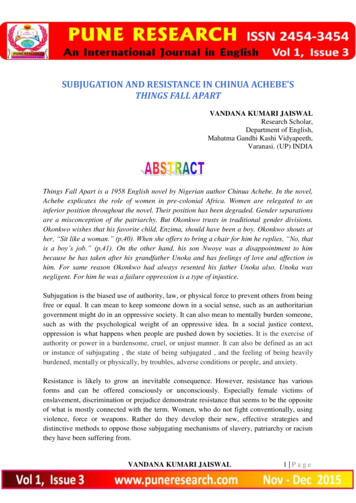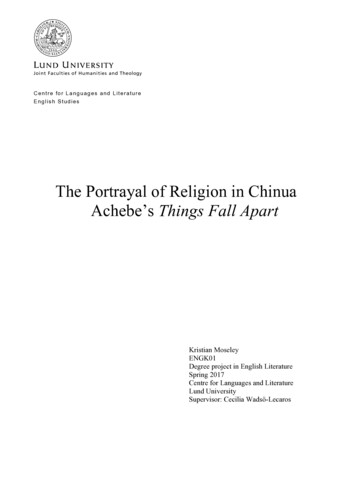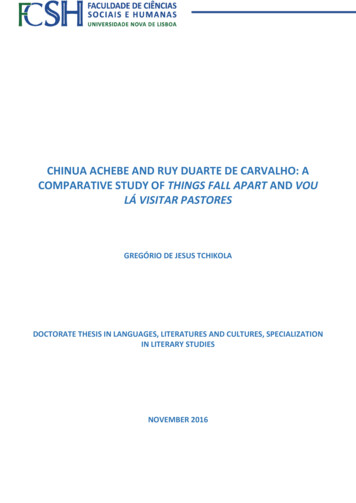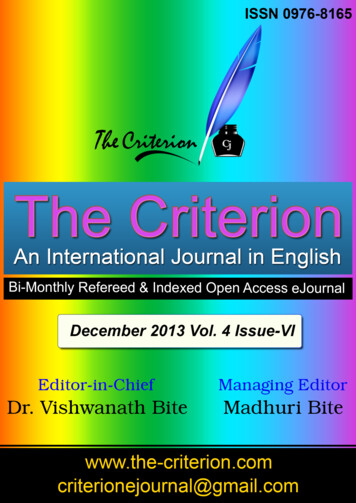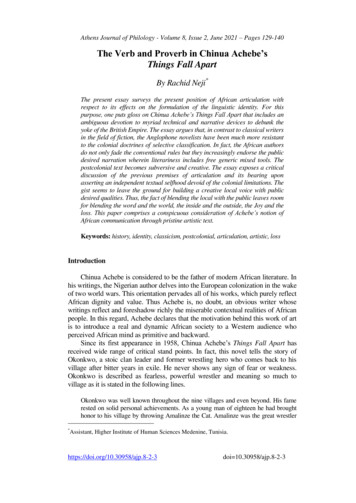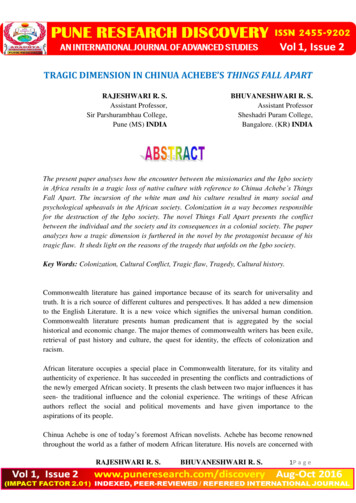
Transcription
TRAGIC DIMENSION IN CHINUA ACHEBE’S THINGS FALL APARTRAJESHWARI R. S.Assistant Professor,Sir Parshurambhau College,Pune (MS) INDIABHUVANESHWARI R. S.Assistant ProfessorSheshadri Puram College,Bangalore. (KR) INDIAThe present paper analyses how the encounter between the missionaries and the Igbo societyin Africa results in a tragic loss of native culture with reference to Chinua Achebe’s ThingsFall Apart. The incursion of the white man and his culture resulted in many social andpsychological upheavals in the African society. Colonization in a way becomes responsiblefor the destruction of the Igbo society. The novel Things Fall Apart presents the conflictbetween the individual and the society and its consequences in a colonial society. The paperanalyzes how a tragic dimension is furthered in the novel by the protagonist because of histragic flaw. It sheds light on the reasons of the tragedy that unfolds on the Igbo society.Key Words: Colonization, Cultural Conflict, Tragic flaw, Tragedy, Cultural history.Commonwealth literature has gained importance because of its search for universality andtruth. It is a rich source of different cultures and perspectives. It has added a new dimensionto the English Literature. It is a new voice which signifies the universal human condition.Commonwealth literature presents human predicament that is aggregated by the socialhistorical and economic change. The major themes of commonwealth writers has been exile,retrieval of past history and culture, the quest for identity, the effects of colonization andracism.African literature occupies a special place in Commonwealth literature, for its vitality andauthenticity of experience. It has succeeded in presenting the conflicts and contradictions ofthe newly emerged African society. It presents the clash between two major influences it hasseen- the traditional influence and the colonial experience. The writings of these Africanauthors reflect the social and political movements and have given importance to theaspirations of its people.Chinua Achebe is one of today’s foremost African novelists. Achebe has become renownedthroughout the world as a father of modern African literature. His novels are concerned withRAJESHWARI R. S.BHUVANESHWARI R. S.1P a g e
the legacy of colonialism at both the individual and societal level. He portrays in English thetribal African culture, to which he belongs and shows how culture was not something theWest gave to the black people. Achebe says that the wants to show,“ the African people did not hear of culture for the first time form Europeans; thattheir societies were not mindless but frequently had philosophy of great depth andvalue and beauty, and they knew poetry above all, they had dignity”(1577)1Chinua Achebe’s Things Fall Apart got published in the year 1958 and is recognized as themile stone in the Commonwealth literature. The novel deals with the tragic humanconsequences of the collusion of the African and European cultures in Nigeria. It is set in atraditional Igbo society, at the time, when the first European missionaries and administrativeofficials were beginning to penetrate inland. Oknokwo, the strongest man in the community,tries to oppose the white man but some of them were won over by the white man’s faith andthe clan is no longer united as before. When his people refuse to follow Oknokwo, theprotagonist commits suicide in anger, frustration and despair. The novel Things Fall Apart isset in the 1890s and portrays the clash between Nigeria’s white colonial government and thetraditional culture of the indigenous Igbo people. The white missionaries saw Igbo asuncivilized individuals in desperate need of their help. Although the motive of the arrival ofmissionaries in Umuofia was to rule over its people, the missionaries should have also seenthis as a way of a cultural exchange between the two. Because both Igbo and the missionarieshas until now not known the culture of each other. The white man believed his culture to bemorally superior to Igbo culture and this caused a conflict between the two cultures.The novel can be roughly divided into three parts. The first part describes the life of the Igbopeople before the arrival of white people. It gives a detailed description of the way of life ofthe Igbo people in a culture of tradition but also of questioning those traditions. The secondpart deals with Okonkwo’s seven years of exile and the arrival of the colonial culture ofmissionaries, bureaucracy and white officialdom; the effects of that arrival, including theconversion of Okonkwo’s son Nwoye and his subsequent alienation from his father. Thethird part deals with how the white people’s law, education, power and economics smotherand destroy the whole Igbo culture as described in the first section; Okonkwo’s return toUmuofia after his exile and his tragic end. The novel deals with the tragic demise of the Igboculture . It shows the gradual disintegration of the native culture when it is confronted bymissionaries.Things Fall Apart presents a well ordered society in which close ties are maintained with theancestors and spirits. The focus of the novel is more on the conflict between native and alienculture. Achebe explores the good and evil prevailing in the native culture as well as in thealien culture. As David Cook points outRAJESHWARI R. S.BHUVANESHWARI R. S.2P a g e
“he prefers to reveal the darker side of both the traditions as well as the better sideand leaves us to draw our own conclusions”.(142)2In the story of Okonkwo, the novelist has brought together the cultural history of a society ata critical point of transition. We see the futile attempt of Okonkwo to fight against aninexorable tide of change which finally overcomes him. Through the community of Igboand Okonkwo’s struggle, Achebe has illustrated that how historical changes affect the societyand culture.“Okonkwo was well known throughout the nine villages and even beyond. His famerested on solid personal achievements. As a young man of eighteen he had broughthonour to his village by throwing Amalinze the Cat. Amalinze was the great wrestlerwho for seven years was unbeaten, from Umuofia to Mbaino. He was called the Catbecause his back would never touch the earth. It was this man that Okonkwo threw ina fight which the old men agreed was one of the fiercest since the founder of theirtown engaged a spirit of the wild for seven days and seven nights”.(3) 3Okonkwo rises from humble origins to become a powerful leader in Umuofia, a rural villagein southeastern Nigeria. As Okonkwo climbs the ladder to success, however, it becomesapparent that his strengths are also his weaknesses: his self-confidence becomes pride, hismanliness develops into authoritarianism, and his physical strength eventually turns intouncontrolled rage. In a broader sense, Achebe sets this story about Okonkwo at the end of thenineteenth century when Europeans first began colonizing this region of Nigeria on a largescale. By so doing, Achebe establishes a parallel between Okonkwo's personal tragedy andcolonialism's tragic destruction of native African cultures.Ikemefuna is brought as a hostage and sacrificed to Umuofia by their neighbours Mbaino toavoid war and bloodshed. As a guardian Okonkwo looked after the boy for three years andthe boy Ikemefuna is friendly with the Okonkwo's son Nwoye. Though Okonkwo is proud ofthe boy, he never admits it openly. This is a tragic flaw of the character as he believed that itis cowardly to openly admit the affection. When the time comes to kill the boy Ikemefuna, asa leader of the clan, Okonkwo takes part in the killing. This is the point of undoing for him.In order not to appear weak he, assists the people in execution of the oracle. The killinginitiates a series of conflicts. It is the beginning of the downfall of the protagonist.The killing of Ikemefuna represents a pivotal episode in the novel not only as a reflection ofOkonkwo's disturbed mental state, but in its reverberation through the novel, as a result of itseffect upon his son, Nwoye. It marks the beginning of the boy's disaffection toward his fatherand ultimately his alienation from the community that Okonkwo has come to represent forhimself. The fate of Ikemefuna, its stark revelation of the grim underside of the tribal ethos,engenders the emptiness in his heart that influences Nwoye to Christian conversion.RAJESHWARI R. S.BHUVANESHWARI R. S.3P a g e
It was not the mad logic of the Trinity that captivated him. He did not understand it. It wasthe poetry of the new religion, something felt in the marrow. The hymn about brothers whosat in darkness and in fear seemed to answer a vague persistent question that haunted hisyoung soul – the question of the twins crying in the bush and the question of Ikemefuna whowas killed. He felt a relief within as the hymn poured into his parched soul. The words of thehymn were like the drops of frozen rain melting on the dry plate of the panting earth.Nwoye's callow mind was greatly puzzled [104].The time Okonkwo returns after his exile, he understands clearly that he does not have aplace in the clan. The missionaries have taken hold of the clan. His own people are not withhim. He finds that the new religion has grown in strength.He knew that he had lost his place among the nine masked spirits who administered justice inthe clan. He had lost the chance to lead his warlike clan against the new religion, which, hewas told, had gained ground. He had lost the years in which he might have taken the highesttitles in the land. But some of these losses were not irreparable. He was determined that hisreturn should be marked by his people. He would return with a flourish, and regain the sevenwasted years. (155)Things Fall Apart is a tragic drama of the whole society. As Irele Aboila feels“Things Fall Apart is the tragedy of one man worked out his personal conflicts-hisneurosis almost-as well as out of the contrariness of this destiny. Yet the title is notwithout relevance, for the novel does have another dimension. Okonkwo’s suicide isa gesture that symbolizes at the same time his personal refusal of a new order as wellas the collapse of the old order which he represents. For Okonkwo’s inflexibility, histragic flaw, is a reflection of his society; his defeat , though a deformation derivesform a corresponding trait in his society, an aspect of it pushed to its extreme logicalfrontiers”.(14) 4A tragic flaw is an attribute of a character that ultimately leads to the demise of that character.This kind of literary device is commonly found in tragedies. Tragic flaws have been animportant part of character development ever since the time of Greek mythology and drama.the protagonist is the victim of the flaw of the character because he is the victim of bothcircumstance and their own essential nature.At a personal level, Okonokwo’s son Nwoye does not listen to his father which is a shock tohim, whereas, at the larger level, the focus of the novel is on the sense of loss and tragicdisintegration of the pattern of native life. Okonkwo despises his father for his laziness andweakness and lack of possessions and title. He thinks that these represent failure, so he strivesRAJESHWARI R. S.BHUVANESHWARI R. S.4P a g e
to be the opposite in all ways. He is presented as one of the ‘great men’ of Umuofia, yet he isdisgraced by his exile and final act of suicide. Okonkwo loves his son Nwoye but treats himvery harshly when Nwoye disappoints him. He thinks highly of Ikemefuna but will notexpress his feelings or admit them to himself .Achebe insists that the past is part and parcel ofour present and already a pre-determinant of the future. Okonkwo is fit for tragedy, becausehe looked life in the face and did what he thought is right. But he is destroyed in the processbecause his nature and a tragic flaw of his character.Inspite of Okonkwo's apparent conformity to norms, and sincerity of purpose we find hefaces tragic dimension in the novel because of his peculiar and eccentric interpretation ofsocial rules. Okonkwo's blinding passion leads him to a final act of egoism that finally markshim with a tragic solitude, rendered tersely in the line in which we finally glimpse him: "Hewiped his machete on the sand and went away" [145].The tragedy is symbolized by the destruction of Okonkwo, who is the very embodiment ofthe tribal values and also its strength and weakness. Okonkwo’s courage and perseverance inbreaking away from his father’s example and creating heroic destiny for himself by followingthe ideals of the tribal society are admirable. But his inflexibility becomes his tragic flaw, themain cause of his downfall. The dislocation of the African psyche following thedisintegration of the older social pattern, as we see it both in Okonkwo and the society is soprofound that a meaningful social and moral reorientation is not within sight. Hence thestarkness of the human tragedy stands out in all its pathos and brilliance in the novel. Thoughthe tragedy of Okonkwo is at once individual, it is at other point the tragedy of the society.Though Okonkwo is almost cast in the mould of Homeric hero, excelling in courage andheroism, he fails to understand his tragic flaw. His action does not allow him to do theretrospection. Even after his understanding that his rigid ways, he still adheres to those valuestill his death.1. Achebe, Chinua . “ The Role of the Writer in a New Nation”. Nigeria Magazine, June1964.2. Cook, David. African Literature: A Critical Overview London: Longman, 1977.3. Achebe, Chinua. Things Fall Apart , London: William Heinemann,1958.4. Irele,Abiola, “ The Tragic Conflict in Chinua Achebe’s Novels”, Critical perspectives onChinua Achebe (ed). C.I. Innes and Bernth Lindtors, London: Heinemann, 1977.RAJESHWARI R. S.BHUVANESHWARI R. S.5P a g e
Chinua Achebe’s Things Fall Apart got published in the year 1958 and is recognized as the mile stone in the Commonwealth literature. The novel deals with the tragic human consequences of the collusion of the Afr
